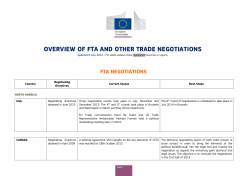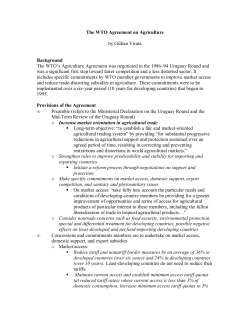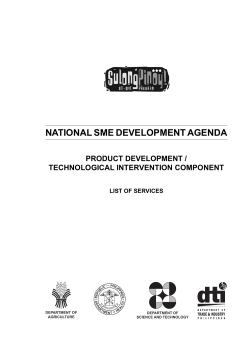
NEWS
FEDERAL NEWS No 1 Patrick Fafard and Patrick Leblond Graduate School of Public and International Affairs University of Ottawa Canada has been negotiating a comprehensive economic and commercial agreement with the European Union (EU) since 2009. This agreement is described as “comprehensive” because it covers not only tariff barriers, but also non-tariff barriers such as different standards and regulations dealing with the production and the nature (form, content, quality, etc.) of goods and services offered in Canada and in Europe. Thus, the Comprehensive Economic and Trade Agreement (CETA) is considered a “second generation” free trade agreement because it is intended mainly to reduce or eliminate indirect barriers to trade and investment (as opposed to direct barriers such as tariffs and quotas). If a deal can be finalized, CETA would be the first agreement of this type between rich countries, and would very likely serve as an international model. However, CETA also presents major challenges for Canadian federalism. This newsletter is published by A Quebec Think tank on Federalism 11-38 Place du Commerce, Suite 189 Montreal, Quebec H3E 1T8 Telephone: 514 889-1499 www.ideefederale.ca info@ideefederale.ca JANUARY 2012 — Vol. 3 A Comprehensive Economic and Trade Agreement (CETA) between Canada and the European Union: Challenges for Canadian Federalism Due to its comprehensive nature, CETA would affect several matters of provincial jurisdiction (shared or not shared with the federal government). For example, CETA covers fields such as energy, the environment, education, transportation, science and technology, etc. It also aims, among other things, to encourage workforce mobility between Canada and the EU, which entails the recognition of professional skills obtained on either side of the Atlantic. It also aims to eliminate discrimination against foreign companies in favour of local ones in the awarding of contracts by provincial and municipal governments (the latter being subject to provincial law). Note that the Government of Canada and the EU are both signatories of a WTO agreement, Canada and the EU have been trying relations since the signing of the Framework Agreement for Commercial and Economic Cooperation between Canada and the European Community in 1976. the plurilateral Agreement on Government Procurement, which stipulates that public contracts must be granted without regard to the nationality of the company that responds to the call for tenders. However, Canadian provinces and territories are exempt from this agreement, which is not the case for regional and local governments in the EU. Canada and the EU have been trying to deepen their economic and trade relations since the signing of the Framework Agreement for Commercial and Economic Cooperation between Canada and the European Community in 1976. However, it is only in the past 15 years that the two parties established agreements, of a limited nature, to accomplish the goals of the Framework Agreement.1 In the autumn of 2005, Canada and the EU tried to deepen their economic and trade ties by entering negotiations for a Trade and Investment Enhancement Agreement (TIEA). This agreement would have moved beyond traditional market access issues and anticipate future issues, such as the need for closer cooperation on regulatory questions. By its nature, such an agreement should have involved the provinces and territories. However, the latter showed little interest in the negotiations, being more focused on those of the WTO Doha Round. This is apparently in large part the reason why the TIEA negotiations were quickly suspended in May 2006 (Kukucha 2011, p. 131). When the time came to launch the CETA negotiations (the TIEA’s successor), it should be no surprise that the EU asked Canada to ensure that provinces (and territories) participate actively in the negotiations, in a manner that goes beyond simple consultation. The reason for this is very simple: if the provinces are not parties to the negotiations, they will be able to say that CETA does not concern them and that they are consequently not obliged to respect its contents particularly those elements that they do not like because of their high economic and, indeed, political costs. The Europeans do not wish to waste their time and energy in negotiating an agreement that could only be partially implemented. Without the full participation of the provinces in the CETA negotiations, and their commitment (political for the moment) to respect the agreement, the liberalization of economic relations between Canada and the EU would likely remain no more than a fond hope in the hearts of some politicians, officials and business people. 1 Since 1997, Canada and the EU have signed the following bilateral trade agreements: International Customs Co-operation and Mutual Administrative Assistance Agreement (1997), Agreement on Mutual Recognition in Relation to Conformity Assessment (1998), Veterinary Agreement (1999), Competition Agreement (1999), Agreement on Trade in Wines and Spirit Drinks (2003), Canada-EU Comprehensive Air Transport Agreement (2009). Despite a history of consultations between Ottawa and the provincial governments during the negotiation of free trade agreements, notably in the case of the United States, this is the first time in Canada that the provinces participate directly in international negotiations regarding trade and investment. Many see this as a positive sign for intergovernmental relations and federalism: i.e., the Canadian federation “works”. Indeed, we should rejoice at the fact that the provinces have a major say in international negotiations that touch directly on matters that concern them and for which they have jurisdiction. However, the real challenge for Canadian federalism is not to include the provinces in negotiations with the EU but to ensure that they play an active part in the finalization and implementation of the agreement and respect their commitments to the federal government and to the EU. FEDERAL NEWS — JANUARY 2012 to deepen their economic and trade 2 3 If the provinces are limited to signing of the document, and of the guarantees to the EU and its companies, would be suspect. For the moment, it is far from clear in the minds of the people around the negotiating table how to make the provinces comply with CETA by harmonizing their standards and regulations and respecting its non-discrimination provisions. For example, will the provinces legally ratify the agreement as parties to it in the same manner as the federal government? Or will they simply sign a political document, without real legal force, in which they undertake to respect CETA? Given that the federal government has the sole constitutional authority to sign international agreements in the name of Canada, it is highly unlikely to accept that the provinces co-sign the agreement, especially as this would give them a veto. If the provinces are limited to signing a political document, the legal value of the document, and of the guarantees to the EU and its companies, would be suspect. In such a case the federal government would be the guarantor regarding any infringement of CETA. This means that it would be legally responsible to the Europeans for the non-respect of the agreement by the provinces, and consequently would pay any compensation judged necessary by a panel of experts under the dispute resolution mechanism, as is currently the case with NAFTA. Note that under Chapter 11 of NAFTA the federal government had to pay $130 million in compensation to the forest products company Abitibi Bowater for the expropriation of certain assets by the Government of Newfoundland and Labrador. At a minimum, it is expected that CETA will contain similar measures to protect European companies seeking to do business in Canada. The political approach could incite the provinces not to respect to provisions of CETA that do not suit them. Furthermore, the weakness of this type of agreement means that subsequent governments might find it easier to ignore the commitments of their predecessors. If there is a risk that various elements of CETA would not be implemented or respected, then Canadian and European companies might decide not to make economic commitments. This would reduce the effect of CETA. Therefore, it is in the interest of all to find a way to formally integrate the provinces and territories in the ratification and subsequent implementation of the agreement. What can be done? There could be a formal meeting of first ministers to conclude a “second generation” federal-provincial agreement that would go beyond a simple political agreement. However, because Prime Minister Harper prefers to avoid multilateral meetings with his provincial colleagues (as did Prime Minister Jean Chrétien), it seems essential that a series of ministerial meetings take place in order to develop an approach that allows the provincial governments and territories to have their say on the final CETA text. Otherwise, given the commitments required from the provinces and territories, it is hard to believe that the ongoing meetings between federal and provincial officials under the C-Trade Committee system would be politically and legally sufficient. FEDERAL NEWS — JANUARY 2012 a political document, the legal value Assuming that the provinces and text, the questions of ratification and especially implementation remain. Assuming that the provinces and territories “approve” the final CETA text, the questions of ratification and especially implementation remain. If Ottawa holds on to its exclusive power to sign international trade agreements, then a parallel agreement between the federal government and the provincial and territorial governments would be useful in order to clearly establish the rights and obligations of each level of government in the implementation of the agreement. Such an agreement could include a commitment to the adoption of laws by provincial and territorial legislatures to ensure existing legislation conforms to CETA’s provisions. Otherwise, nothing would bind the provinces and territories to the federal government and the EU when the time comes to respect the commitments made in the context of CETA. Such an approach also offers a way to promote more open and transparent discussion of the advantages and disadvantages of an economic and trade agreement with Europe. Until now, following the usual practice for negotiations between governments, there has been very little public debate about CETA and its contents. A legislative process in each of the provinces and territories could fill this void of public discussion. The risk, evidently, is that some provinces might demand changes to the agreement (or simply reject it) in response to interest group concerns if not outright opposition to the agreement. However, if the provincial and territorial governments engaged in effective consultations with the various interested parties during the negotiations, then there would be no surprises for anyone; however, this would require a more open process from the outset, which does not seem to be what has happened so far. In summary, even if the practice of Canadian federalism has been modified to find an effective and informal way to include the provinces and territories in the CETA negotiations, the real issues that are the ratification and implementation of the agreement by the provinces and territories remain unresolved. More generally, if Canada wishes to convince other international economic partners to negotiate “second generation” trade agreements in the future, it must find clear and transparent mechanisms whereby the provinces and territories can formally commit to respect not only CETA but any agreement that Canada signs. This would be the basis of a real open federalism in Canada. References Government of Canada, “Canada’s International Policy Statement: A Role of Pride and Influence in the World (COMMERCE)”, Ottawa, Department of Foreign Affairs and International Trade, 2005. Christopher J. Kukucha, “Provincial pitfalls: Canadian provinces and the Canada-EU trade negotiations”, in Kurt Hübner (dir.), Europe, Canada and the Comprehensive Economic and Trade Agreement, New York, Routledge, 2011, pp. 130-150. FEDERAL NEWS — JANUARY 2012 territories “approve” the final CETA 4
© Copyright 2025

















